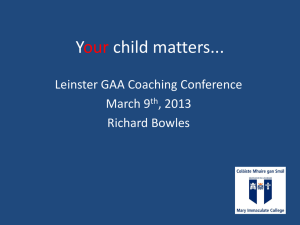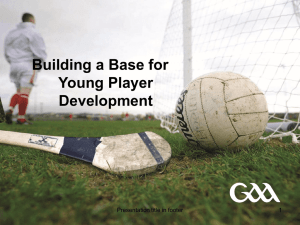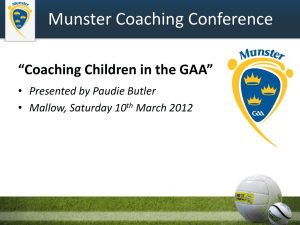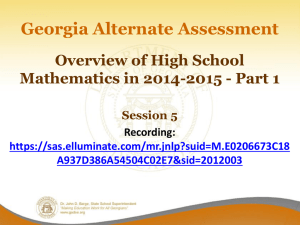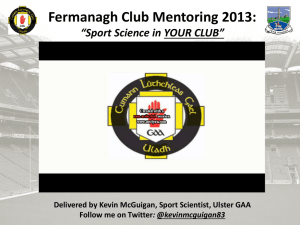The Skills of Hurling
advertisement
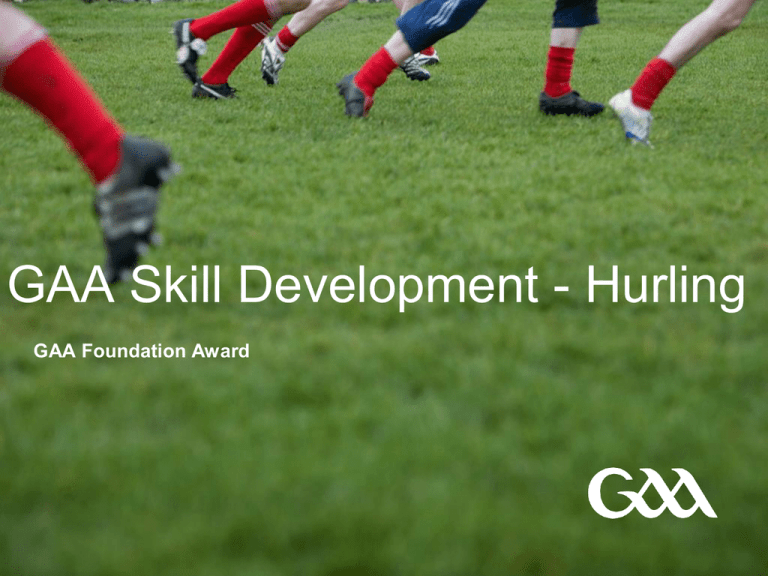
GAA Skill Development - Hurling GAA Foundation Award GAA Skill Development - Objectives By the end of this session, participants will be able to: – Identify the skills of Hurling – Identify the three phases of learning – List the steps involved in coaching a skill – Organise and oversee activities to practice 5 key skills of Hurling 2 Presentation title in footer © GAA Skill Development Identify the Skills of Hurling? 3 Presentation title in footer © GAA The Skills of Hurling Can be divided into: Skills used to Gain Possession – Involves gaining possession and control of the sliotar. Skills such as catching, and lifting are included along with skills involved in getting control of the sliotar using the Hurley. Skills used to Maintain Possession – Once the sliotar is under the control of the player, there are a number of skills which help the player in possession to maintain possession. These skills encompass ground skills, handling skills and evasion skills Skills used to Release Possession – Involves striking the sliotar, with either the hand or the Hurley. Many of these skills can be performed with a stationary sliotar or a moving sliotar, while the player is stationary or while the player is moving. Skills used to Contest Possession – Involves many of the skills used to tackle an opponent in possession, or to contest for possession when neither player is in possession of the sliotar. 4 Presentation title in footer © GAA The Skills of Hurling Gaining Possession Maintaining Possession Releasing Possession Contesting Possession Other Skills The Ground Block The Dribble Striking a Stationary Ball The Frontal Air Block The Grip Controlling a Moving Ball The Solo Run Ground Strike on the Run The Hook The Swing Blocking a Ball Overhead Evasion/Roll Off Doubling Back Shoulder to Shoulder Clash The Chest Catch The Feint/Side Step Striking from the Hand Shoulder to Shoulder Charge The Jab Lift The Overhead Strike The Frontal Ground Block The Roll Lift The Hand Pass The Ground Flick The Overhead Catch Batting a Ball Overhead Checking 5 Presentation title in footer © GAA Phases of Skill Development Three phases of skill learning Early – Lots of errors – depends on the coach for instruction and direction Intermediate – Achieved basic level of competence – Performs the skill faster in an appropriately structured competitive environment (games / activities) Advanced – Skill is automatic and is performed under pressure. Focus is on advanced skills and team play. 6 Presentation title in footer © GAA Reduced Space/Time Movement Opponent 7 Presentation title in footer Introducing Players in the External Focus on the early phases of Demands too relevant learning will early affects technique not bethe ableisto dealreduced with these achievement of effectively the advanced phase Decision Making Speed Other Techniques © GAA Coaching a Skill 8 Presentation title in footer I. Introduce D. Demonstrate E. Execute A. Attend © GAA Coaching a Skill Stage 1 Brief Description of Skill List Key Points 9 Presentation title in footer © GAA Coaching a Skill Stage 2 Demonstrate (a) Normal Speed x3 (b) Slow Motion (c) Normal Speed 10 Presentation title in footer © GAA Coaching a Skill Stage 3 Introduce and Set Up Routine Simple and Easy to understand 11 Presentation title in footer © GAA Coaching a Skill Stage 4 Give Positive Feedback 12 Presentation title in footer © GAA Coaching a Skill Stage 5 Continue Routine 13 Presentation title in footer © GAA Coaching a Skill – Organisational Hints 1. Gather in a semi- circle 2. Separate ‘Giddy’ Players 3. Gather in Footballs/ Sliotars 4. Face players away from distractions and sun 5. Speak with the breeze 6. Coach doesn’t have to be able to demonstrate skill 7. Match task to players’ ability 8. On whistle – Activity stops and players jog to coach 14 Presentation title in footer © GAA Coaching a Skill In Groups take the Skill Cards. Task is to set up, demonstrate and organise activities from the Skill Card for one of the following skills: 1. Grip & Swing 2. Jab Lift 3. Chest Catch 4. Strike from Hand 5. Frontal Block Down 6. The Hand Pass 15 Presentation title in footer © GAA GAA Skill Development and Coaching Skills are taught when the coach Aims for mastery of the skill Knows the observable components of the skill Spots the ‘bits’ of the skill being performed incorrectly. Gives Feedback about skill performance (communication). Praises the parts being performed correctly (communication) Instructs how to modify the bits that need correction (communication). Demonstrates how to do the ‘bits’ of the skill correctly. Coaching allows players to risk error to achieve success Focuses on one component of the more complex skills at a time. 16 Presentation title in footer © GAA Coaching a Skill “Tell Me and I Forget” We remember 10% of all we hear. “Show me and I remember” We remember 50% of all we see. “Involve Me and I understand” We remember 90% of all we do. 17 Presentation title in footer © GAA GAA Skill Development – Objectives Review By the end of this session, participants will be able to: – Identify the skills of Hurling/Gaelic football – Identify the three phases of learning – List the steps involved in coaching a skill – Organise and oversee activities to practice 5 key skills of Hurling/Gaelic football 18 Presentation title in footer © GAA Thank you
